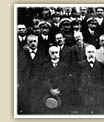
In order to impose his tyranny
he did not hesitate to sacrifice the supreme interests of the Greek people
to our national competitors, with the intention to assist the German victory,
on which alone he could found his kingship by divine right. And in order to
prevent the rapid equipment of those patriots, who aligned with the traditional
friends and protector Powers against the common enemies, he did not hesitate
to turn the Greek arms against the soldiers, the fathers of whom had shed their blood
for the cause of Greek independence. Taking advantage of the occasion
he launched his royal army to slaughter those, who preserved their national spirit
intact to the end. From this very moment King Constantine is deposed of his throne.
We do not doubt that the people as a body will approve of this deposition, which concerns
the tyrant King personally and not the dynasty.
The provisional government Venizelos, Koundouriotis, Danglis
(Text dispatched by the provisional government to its local representatives
on 24 November 1916, in G.Th. Mavrogordatos, Meletes kai keimena
gia tin periodo 1909-1940, Athens-Komotini, Sakkoulas edition, n.d., pp. 88-89)
Yesterday afternoon in the church of St Dionysios a prayer has been delivered
in favour of the King, all parishioners being present. Amidst deadly silence
and devoutness everybody kneeling along with the priest prayed for the
salvation of the King and the crush of the hideous traitors and enemies
of the fatherland, with the inspired priest Papafotis shouting "Long live
the King and eternal anathema on the traitors". After the prayer,
Mr Doufas, being present in the church, talked about the godly-inspired mission
of our King and the immortal Greek race, admonishing loyalty and
devotion to the King and his army, as well as composure and endurance
in this crucial period of our national life.
(Excerpt from the newspaper Chronos, 5 December 1916, in G.
Th. Mavrogordatos, Meletes kai keimena gia tin periodo 1909-1940,
Athens-Komotini, Sakkoulas editions, n.d., p. 89.
|
 |
